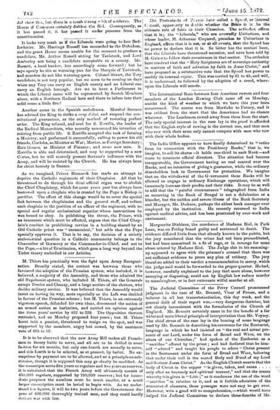As we imagined, Prince Bismarck has made no attempt to
deprive the Catholic regiments of their Chaplains. All that he threatened to do through his demi -official organ was to abolish the Chief Chaplaincy, which for some years past has always been bestowed upon a chaplain who is created by the Pope a Bishop in partibus. The effect of this change would be to sever the special link between the chaplaincies and the general staff, and reduce each chaplain to the position of an officer of the regiment, with no special and regular ecclesiastical superior whose instructions he was bound to obey. In publishing the threat, the Prince, with an innocence which must be affected, argues that the Chief Chap- lain's conduct in prohibiting service in a building shared by an Old Catholic priest was " uncanonical," but adds that the Pope specially approves it. That is to say, the decision of a strictly ecclesiastical question in a Catholic community belongs to the Chancellor of Germany or the Commander-in-Chief, and not to the Pope,—a bit of Erastianism, which goes a long way beyond the Tudor theory embodied in our Articles.


































 Previous page
Previous page